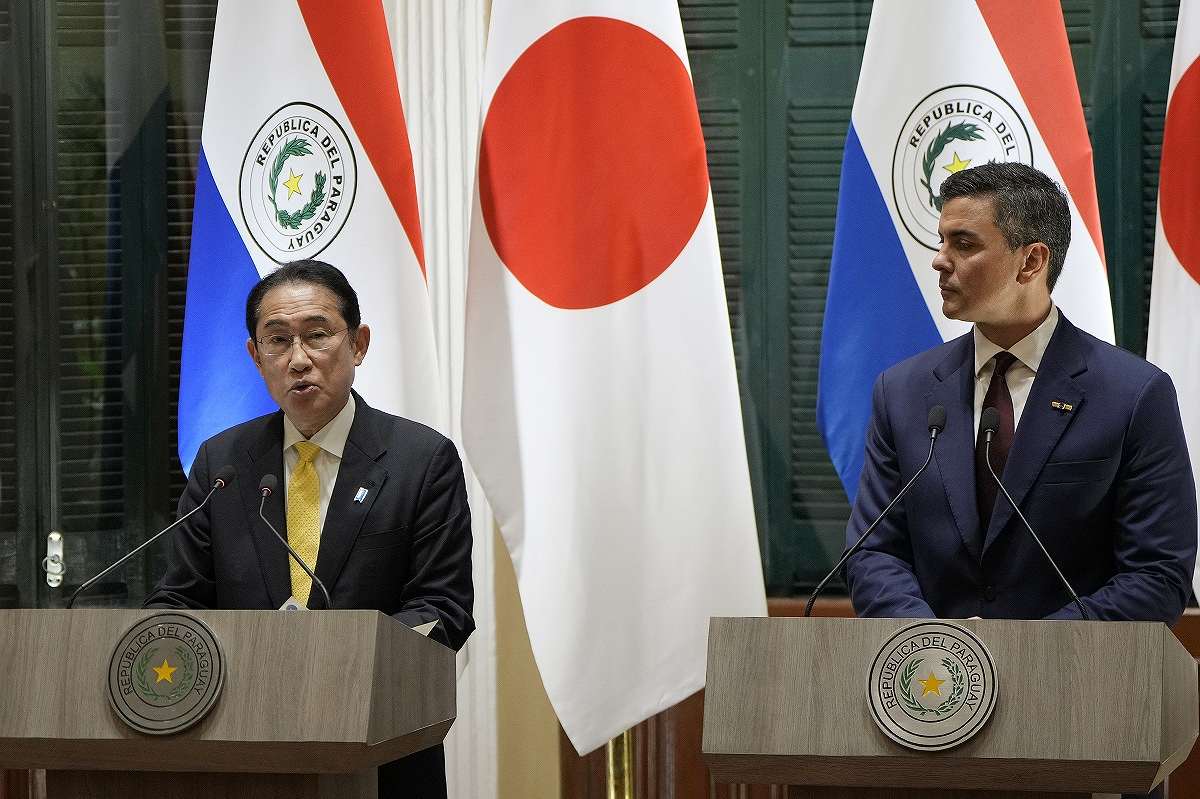Paraguay President Seeks Immediate EPA Talks with Japan; Defends Ties with Taiwan Against Rising Pressure

Japan’s Prime Minister Fumio Kishida, left, speaks during a joint news conference with Paraguay’s President Santiago Pena, at the presidential palace in Asuncion, Paraguay, Friday, May 3, 2024.
17:17 JST, May 4, 2024
ASUNCION — Paraguay’s President Santiago Pena expressed eagerness to immediately start negotiations on an Economic Partnership Agreement (EPA) between Japan and the Southern Common Market (Mercosur), a union consisting of Brazil, Argentina and other countries, during an exclusive interview with The Yomiuri Shimbun in the capital of Asuncion on Thursday.
The interview was conducted ahead of a summit meeting with Prime Minister Fumio Kishida on Friday.
Paraguay currently holds the rotating presidency of Mercosur for the first half of this year, and the decision to move forward with the EPA negotiations is the focus of the bilateral summit meeting.
Paraguay is the only country in South America that maintains diplomatic relations with Taiwan. Referring to pressure from home and abroad to establish diplomatic relations with China, Pena said: “We believe that our relationship with Japan and the United States should serve as a shield [against such pressure]. Support for Paraguay will also support Taiwan.” He called on Japan to expand investment and open up its meat market.
According to the United Nations Economic Commission for Latin America and the Caribbean, the trade volume between China and the Central and South American-Caribbean region expanded from about $14 billion in 2000 to nearly $500 billion by 2022 — a 35-fold increase. China has become the second-largest trading partner with the region after the United States.
Pena expressed particular concern over Argentina signing over management to a Chinese company of waterways vital for transportation in South America. He also expressed concerns about China’s acquisition of interests in important resources like lithium.
Paraguay, a landlocked country in the heart of South America, established diplomatic relations with Taiwan in 1957. With a population of about 7 million, Paraguay values its friendly ties with Taiwan, drawing on historical parallels of oppression by neighboring powers. Between 1864 and 1870, Paraguay lost more than half of its male population in conflicts with Brazil and Argentina.
Regarding Paraguay’s bilateral relationship with Taiwan, Pena said, “Our position regarding Taiwan is unwavering. However, the stronger our stance, the greater the pressure from countries seeking to dissolve our relationship.”
He revealed that he had been advised by Brazilian President Lula da Silva to establish diplomatic relations with China.
Pena acknowledged pressure from domestic agricultural groups. While Paraguay is a major exporter of soybeans and beef, it cannot export beef to China and needs to rely on third-party countries like Argentina for soybean exports. During last year’s presidential election won by Pena, opposition candidates called for severing ties with Taiwan. Pena revealed his inner struggle, saying: “The question is, how long can we endure? How much pressure, accompanied by pain, will we have to bear?”
He stressed, “If we can demonstrate that maintaining relations with Taiwan is in the national interest, Paraguay can become a beacon for other countries.”
China has not concealed its dissatisfaction with Paraguay’s stance. In a press conference in March, Lin Jian, deputy director general of the press department of the Chinese Foreign Ministry, criticized Paraguay by name.
“Paraguay should not act recklessly but should assess the situation carefully and stand on the right side of history,” Lin said.
Top Articles in Politics
-

Japan PM Takaichi’s Cabinet Resigns en Masse
-

Sanae Takaichi Elected Prime Minister of Japan; Keeps All Cabinet Appointees from Previous Term
-

Japan’s Govt to Submit Road Map for Growth Strategy in March, PM Takaichi to Announce in Upcoming Policy Speech
-

LDP Wins Historic Landslide Victory
-

LDP Wins Landslide Victory, Secures Single-party Majority; Ruling Coalition with JIP Poised to Secure Over 300 seats (UPDATE 1)
JN ACCESS RANKING
-

Producer Behind Pop Group XG Arrested for Cocaine Possession
-

Japan PM Takaichi’s Cabinet Resigns en Masse
-

Man Infected with Measles Reportedly Dined at Restaurant in Tokyo Station
-

Israeli Ambassador to Japan Speaks about Japan’s Role in the Reconstruction of Gaza
-

Videos Plagiarized, Reposted with False Subtitles Claiming ‘Ryukyu Belongs to China’; Anti-China False Information Also Posted in Japan

























